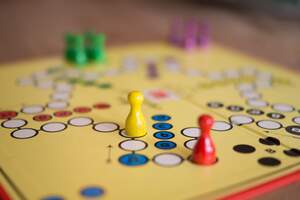

Mudd Day
Mudd Day marks the birthday of Dr. Samuel Mudd, a man who harbored John Wilkes Booth in his home after President Lincoln's assassination, and who was accused of being one of the conspirators of the assassination. It is unclear why a holiday commemorating Dr. Mudd was created, or by whom.
John Wilkes Booth assassinated President Abraham Lincoln at Ford's Theater in Washington D.C., on April 14, 1865. He broke the fibula in his leg while jumping from the president's box seat to the stage. After meeting up with David Herold, they rode by horseback and arrived at the home of Dr. Samuel Mudd at about 4 a.m., about five miles north of Bryantown, Maryland. Dr. Mudd was a supporter of slavery and the Confederacy, and no fan of President Lincoln. He first put Booth on his sofa, but then carried him upstairs and splinted his leg there. He then allowed Booth and Herold to sleep upstairs.
On the following morning, Dr. Mudd procured a pair of crutches for Booth from a nearby carpenter. He also tried to get Booth and Herold a carriage but was unsuccessful. Booth shaved off his mustache, Dr. Mudd gave them some directions, and they left during the late afternoon, after being at Dr. Mudd's for at least twelve hours. Two weeks later, Booth and Herold were found by Union cavalry in a tobacco shed in Virginia. Herold surrendered, but Booth refused. The shed was set on fire, and Booth was shot as he came out.
The question of how much Dr. Mudd knew about Booth and the assassination, and if he was complicit in any of the plans, came up after he helped Booth and Herold. Some said that Dr. Mudd had been a doctor just doing what he was supposed to do—treat patients—and that he was just in the wrong place at the wrong time. But, Dr. Mudd went into town for errands on the day the fugitives left his house, and it is certain he would have at least heard about the assassination by then, yet he failed to report for another 24 hours that Booth and Herold had been at his house, which gave them more time to escape.
Lt. Alexander Lovett arrived at Dr. Mudd's house on April 18. In Lovett's view, Dr. Mudd seemed to be acting suspiciously. Dr. Mudd also told him that he did not know the person who he had aided at his house. Lovett returned on April 21, and after searching the home, he found Booth's riding boot which had "J Wilkes" written inside of it. He showed Dr. Mudd a picture of Booth, and Mudd still said he didn't recognize the man.
Dr. Mudd was arrested on April 26, the same day that John Wilkes Booth was killed. He was put on trial by a military commission. Throughout the trial, Dr. Mudd changed his story multiple times and didn't let on that he knew anything about the conspiracy to kill President Lincoln. One of the most important parts of the trial was determining the prior relationship of Dr. Mudd with Booth and the other conspirators, and the prosecution focused on these relationships.
Witnesses said they saw Dr. Mudd and Booth together in November 1864 in Maryland. It was believed that Dr. Mudd had been helping Booth buy a horse. They met afterward, likely on more than one occasion according to witnesses. These meetings showed that Mudd had likely lied to investigators when he told them he didn't know who he had treated on the early morning hours of April 15.
Dr. Mudd eventually changed his story to say that indeed he did remember meeting Booth the previous November, but not on any of the other occasions that the witnesses were claiming. But, he was still not able to explain why he did not recognize Booth on the day he treated him. The Defense attorney also couldn't explain why after hearing of the assassination, Mudd hadn't thought it strange that someone with a broken leg had shown up at his house and also shaved off his mustache. Additionally, Dr. Mudd's political beliefs and past negative statements about President Lincoln were used against him.
The defense said that it wasn't a crime to fix a broken leg, even if it would have been of a presidential assassin, and even if the person fixing the leg knew the person was an assassin. The defense also said that in order for the prosecutors to have a case, they needed to prove that Dr. Mudd actually aided in moving the conspiracy forward. The prosecution countered by saying that the evidence against Dr. Mudd was stronger than the defense said it was, and that Dr. Mudd had aided in the conspiracy when he gave Booth and Herold directions before they left his farm.
On June 29, 1865, the military commission found Dr. Mudd guilty of conspiring to murder President Lincoln. He was sentenced to life in prison, being just one vote short of getting the death penalty. Not everyone was so lucky; eight days later, four were hung for their role in the assassination, including David Herold.
Dr. Mudd was sent to Fort Jefferson, a federal prison in the Dry Tortugas, which are a group of islands off the coast of Florida. One of the people transporting him was George Dutton, who said that Dr. Mudd admitted to him during the transport that he had known who Booth was when he had treated him, and that he had met Booth on multiple occasions. At the prison, yellow fever broke out in 1867. After the prison doctor died from it, Dr. Mudd stepped up and filled the role as the prison doctor. Dr. Mudd was pardoned by Andrew Johnson in 1869. He died of pneumonia on January 10, 1883.
The phrase "Your name is mud" did not come from Dr. Samuel Mudd, but he gave it new meaning. "Mud" referred to something worthless or unwholesome since the sixteenth century. By the eighteenth century, the word applied to people who were seen as foolish or stupid. It was also used to intensify phrases. For example, something could be said to be "as rich as mud." The word was also used as an epithet, and "Your name is mud" became a popular phrase.
How to Observe Mudd Day
You could mark the birthday of Dr. Samuel Mudd in the following ways:
- Visit The Dr. Mudd House Museum. You may need to plan your visit for a later date, as the museum is not open year round.
- Read a book about Dr. Samuel Mudd or Lincoln's assassination.
- Watch a film about Dr. Mudd, such as The Prisoner of Shark Island or The Ordeal of Dr. Mudd.
- Visit Ford's Theatre.
- Visit Fort Jefferson at Dry Tortugas National Park.
- Visit Dr. Mudd's grave.
- Check out the Free Dr. Mudd Facebook page.
- Use the phrase "Your name is mud."





















